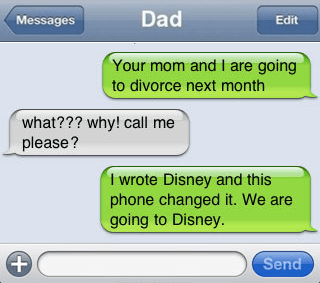Business texting has been on the rise in the past decade. For most, a quick message to one’s mobile phone is the most preferred method of communication on a personal level. But what about business? We’ve spoken before about how a small business owner can use text messaging as an effective way to communicate with customers. But, sometimes it’s hard to figure out how one can do so without crossing the line. Read below for business texting do’s and don’ts and learn how customers want to be communicated to through this media.
Business Texting Do’s
1. Keep it positive.
Business texting is much like email communication in that the tone can easily be misconstrued. People can sometimes take things the wrong way without hearing the inflection of your voice. Be sure to write complete sentences to ensure that you won’t come off as terse. Another way to ensure you won’t seem rude is is always use ‘please’ and ‘thank you.’
2. Complete, complete, complete!
Sentences aren’t the only thing that needs to be complete when using business texting. Spell out your words! When you use text-speak like ‘l8r,’ ‘u’ instead of ‘you’ or ‘r’ instead of ‘are, you seem very unprofessional! It also reflects poorly on how you treat others. Someone may feel undervalued if you can’t take the time out to add a few more letters to your words when communicating with them.
Also, complete your thought! Text messages are meant to be brief, and to the point. If you have a lot to share, text isn’t the medium for the message.
Complete your words, complete your sentences, and complete your thought in one message.
3. Check yourself!
Don’t wreck yourself. Auto-correct fails are a thing. Yeah, it may seem funny when you read screenshots online from other people whose auto-corrected texting ended in laughable miscommunication, but don’t let something like this happen when business texting:

or like this:
Make sure to always read and reread your messages if you want to avoid embarrassment. If you’re using the voice-to-text feature, it is even more important that you double check what was interpreted!
4. Send a text if the information is urgent.
If you want someone to know information quickly, using text message is the way to go. Why? Studies show that ninety percent of people read a text message within three minutes after it was sent. With the amount of emails being received throughout the day, you can’t expect the same when you send an email.
5. Be wary of what you send.
Everything sent via text message can easily be screenshot and then relayed to another person. Don’t send anything confidential. You should never speak ill of a colleague, but you especially shouldn’t do over text message. Make sure all that you send through text message is necessary and kind.
6. Get permission ahead of time.
People have different preferences for business communication. Just because someone at a networking event gave you their business card with their mobile number doesn’t mean that you automatically can shoot them a text about a business partnership you’d like to have with them. In fact, only 4% of business professionals prefer text over other forms of communication. So, just ask: “do you mind if I text you regarding business matters?”
7. Include your name.
If you haven’t messaged this person before, be sure to tell them who you are within the message. You don’t want to leave them guessing.
8. Have a clear ending to the conversation.
Once your communication goal has been reached, exit the conversation with grace. With messaging, it can, at times, be unclear when the conversation is over. Because of this, it is polite to thank the person and let them know that you’ll touch base with them at a later time regarding what has been discussed.
Business Texting Don’ts
1. Don’t use text messages for all topics
This isn’t the best method of communication for certain things. If the topic is very serious, save the conversation for an in-person meeting, and if that’s not available, the phone. You should never inform someone of bad news via text. It’s impersonal and rude. Also, if you want to receive a referral anytime in the future, sending a text to your boss notifying them of your resignation is not the way to do it.
2. Never text a last-minute cancellation.
Studies show that ten percent of text messages aren’t read three minutes after being sent. If you’re cancelling last minute, it would be very rude to send a text and assume that the other party will receive it before heading out to meet you. This is another situation when a phone call would be preferred. Imagine if they are already on the road, and don’t read the message until they get to the planned destination? This would not be ideal.
In fact, for this same reason, don’t make any changes to plans last minute through text, either. That means you shouldn’t change time or venue during the last moment, in case they aren’t checking their messages.
3. Don’t ever text and drive.
Speaking of en route text messages, there is never an instance when anyone should be reading or writing text messages while driving. Not for business purposes, or ever. It’s too dangerous and you shouldn’t put you or someone else’s life at risk to send a message.
4. Don’t text outside of business hours.
Everyone needs a break, be it on to relax from the holiday rush or to get some time away with their family. Take this into consideration and don’t send colleagues or prospects clients after general business hours. If people don’t think you value their off-time, it’ll rub them the wrong way.
5. Avoid emoticons.
You don’t want to come off as too casual when sending a business-related message. Emojis and emoticons are just too informal for the occasion. Save that type of messaging for your buddies.
6. Don’t text during meetings.
You wouldn’t start having a separate conversation out loud during a meeting, would you? As virtual receptionists at an answering service, we’re excellent multitaskers…but we still wouldn’t dare! If you’re texting during a meeting, you’re saying that the meeting isn’t important to you. That’s definitely not professional. Don’t do it!
7. Don’t send a text if a call or email would be more appropriate.
If you’ll need to have a conversation with plenty of back and forth, a call would be better. A call would also be necessary if you’re needing to send confidential information. If you have a lot of information you need to give to a person, this may be a situation in which an email would be better. Make sure that the medium suits the message.
8. Don’t think of texting as your main form of business communication.
Think of texting as a complement to calls and emails. Take it from Eddi Ricci of personalbrandingblog.com:
Apply this to your small business
You’ve probably heard that millennials prefer texting, but the jury is still out on texting for professional communication. Make sure you tread lightly and politely when entering the newer reals of business communication.
Now, give this a try:
Take into consideration how text messaging within your business can complement your current forms of communication. If you decide to begin text messaging for business purposes, make sure you and your team do so with the right etiquette. Send out a link to this article to your team mates, so they can know all of the do’s and don’ts of business texting as well!



